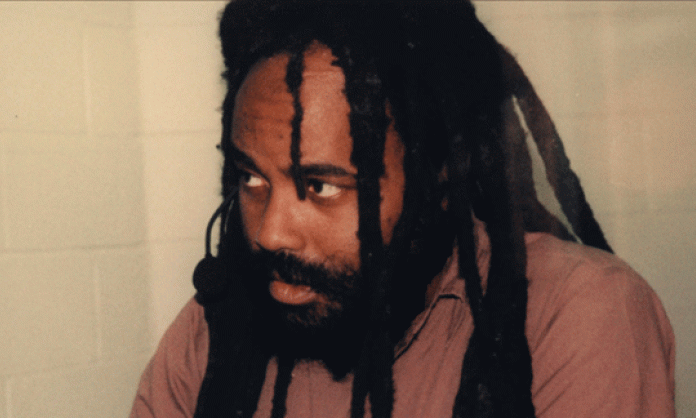Mumia Abu-Jamal is a US political prisoner. He was framed, convicted and sentenced to death for the 1981 murder of a Pennsylvania police officer. It was part of an FBI and police crackdown on militant Blacks. The state continues to target him.
The Pennsylvania legislature has unanimously adopted the Revictimization Relief Act. The act allows the censoring of public speeches of prisoners and former prisoners in the event that they would cause “mental anguish” to alleged victims or their families.
Democratic governor Tom Corbett signed it into law after Abu-Jamal delivered a taped speech on 5 October to students graduating from Goddard College, a small private university in Vermont, which he had attended as a youth.
While the immediate target is Abu-Jamal, the number of people who could be denied the right of free speech is quite large – more than 50,000, and predominantly young, Black and Latino.
Defending the law, governor Corbett said, “[N]obody has a right to continually taunt the victims of their violent crimes in the public square.”
In a 27 October interview on Democracy Now!, Abu-Jamal replied to Corbett: “He knows that’s ridiculous, both in law and fact. I’ve never taunted anybody. I’ve rarely talked about the events of December 9, 1981. I’ve talked about all kinds of other issues.
“I was invited by the staff and students and the administrators to talk to my college about what it meant to get an education from Goddard. I did that. And if the Constitution doesn’t protect that, then it protects nothing.”
If the law is ever used, its constitutionality will be challenged. It will most likely be struck down. But if it ever makes it to the current US Supreme Court, noted for its rightist decisions, including against Black voting rights, who knows?
A history of persecution
Abu-Jamal has been involved in militant Black politics since he was a teenager. From the age of 14, he was a supporter of the Black Panther Party, writing news and information for it in Philadelphia. After leaving the Panthers in 1970, he took courses in journalism and continued to write and speak on public radio.
Over the three decades since the frame-up, his regular taped speeches and written columns from prison have become well known and reproduced. The authorities have made repeated attempts to silence and smear him, even internationally.
In 1995, he was put in solitary confinement under the charge that, by having his writings published, he was engaging in illegal “entrepreneurship”.
After the 1996 airing of the documentary Mumia Abu-Jamal: a case for reasonable doubt, which included video footage of visitation interviews with him, prison authorities banned outsiders from using recording equipment, including pencils and paper, in interviews with prisoners in any Pennsylvania state prison.
In April 2006, a newly paved road in the Paris suburb of Saint-Denis was named after him.
In protest, US congressman Michael Fitzpatrick and senator Rick Santorum, both Republicans from Pennsylvania, introduced resolutions condemning Saint-Denis. The Fitzpatrick resolution was passed by 368 to 31, with wide support from both parties.
In December 2006, the Republican Party in Philadelphia filed criminal complaints in France against the cities of Paris and Saint-Denis.
Since 1991, Abu-Jamal has appeared on Democracy Now! many times. Speaking to Amy Goodman, host of the show, he recently said, “You remember me calling you and them coming up and pulling [the phone] wire out of the wall.
“I believe it was 1996, or around that time. We were having a live discussion [on the radio show], and I saw out of the corner of my eye a correctional officer walk down to where my line was plugged into the wall, and he pulled it out …
“That was shortly after the publication [of Mumia’s book] Live from Death Row, and the Department of Corrections sanctioned me, gave me a write-up and we went to court about it.
“The case is preserved as Abu-Jamal vs. Price. In that ruling, the Third Circuit of the United States Court of Appeals said I have the constitutional right to write.
“If I have the constitutional right to write under the First Amendment, then don’t I have the constitutional right to read my writings?”
Despite the overwhelming evidence amassed by the national and international defence campaign of the racist nature of the frame-up of Mumia, the Pennsylvania courts have consistently ruled against a new trial.
There has been one victory for the campaign, however. The instructions to the original jury by the racist judge concerning sentencing were finally acknowledged to be so egregious that in 2012 his death sentence was overturned, and he was released from Death Row into the regular prison population.
In his 27 October interview with Democracy Now!, Mumia discussed the difference being off Death Row has made: “Not a day goes by that I don’t think about the brothers and sisters – because there are women in Pennsylvania on Death Row. [Being in the general prison population] is so profoundly different from their 24-hour experience that it’s hard to connect the two.
“Holding them in solitary confinement … is a violation of the Constitution [against cruel and unusual punishment] … All the men and women who are on Death Row now in Pennsylvania should be in general population like everybody else.”










